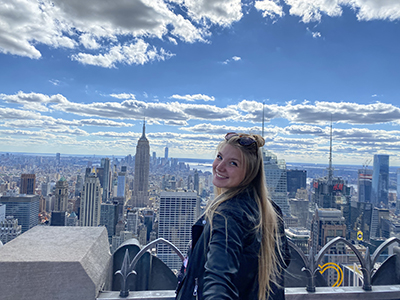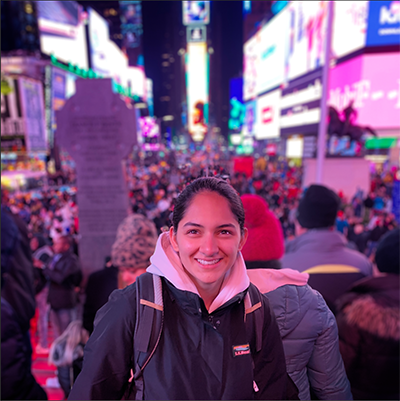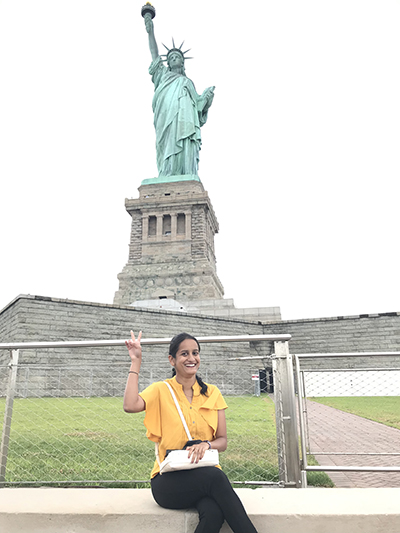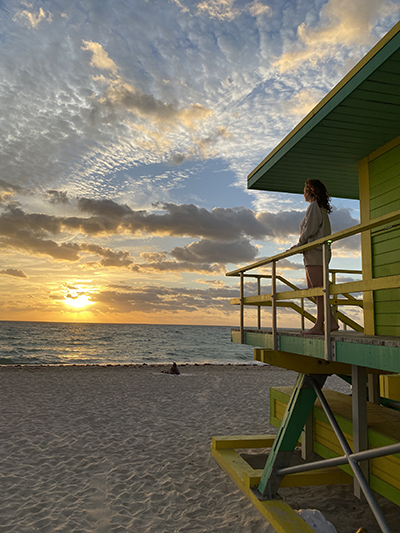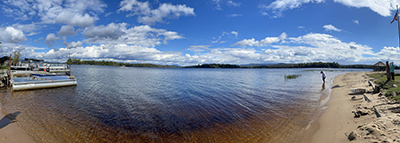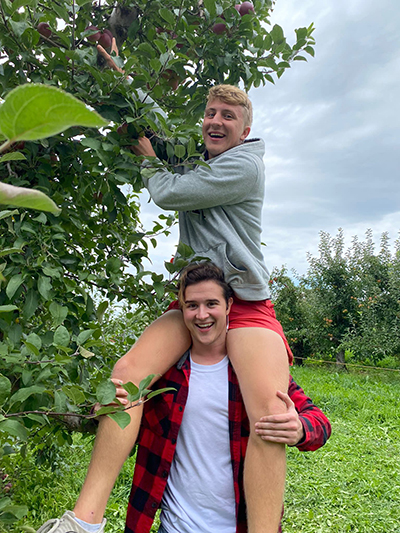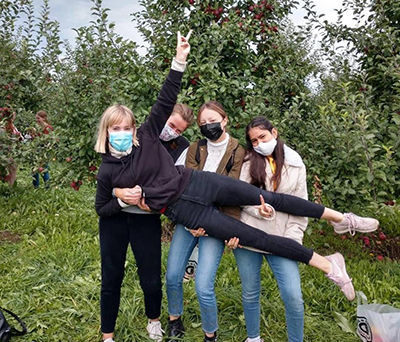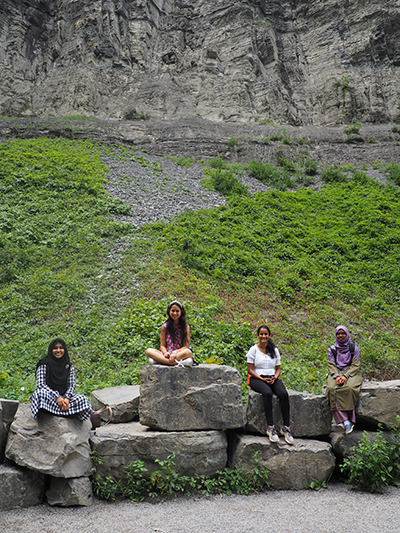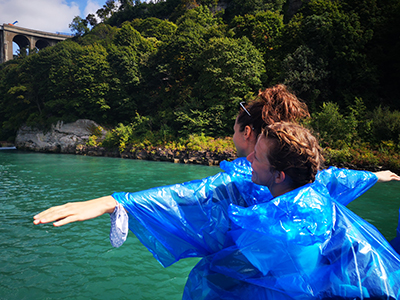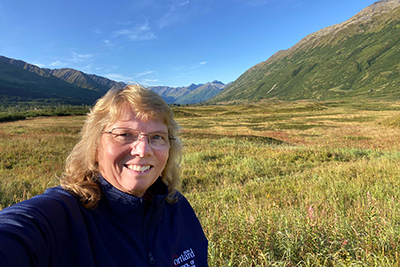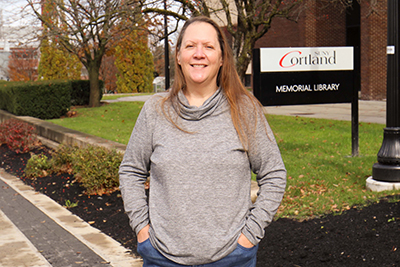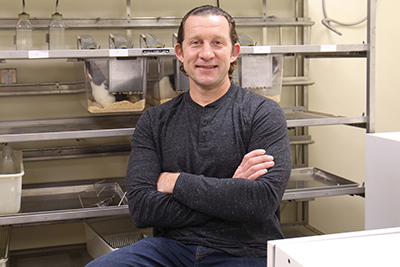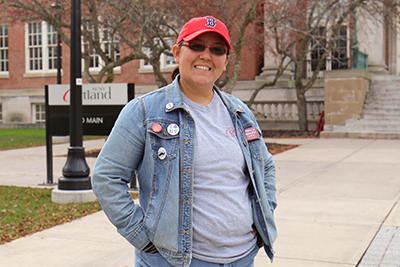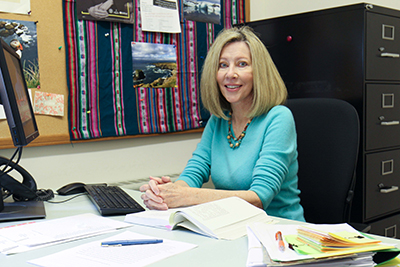
|
|
Issue Number 7 • Tuesday, Nov. 23, 2021 |
Campus ChampionLindsey Quinn, president of SUNY Cortland's women’s rugby club, the Peace Frogs, has helped lead the team to the national semifinals. Next week, 20 members and two coaches will fly to Knoxville, Tennessee to play in the National Collegiate Rugby (NCR) Small College national playoffs on Saturday, Dec. 4 and Sunday, Dec. 5. Lindsey, a senior physical education major and a member of the Reserve Officers’ Training Corps (ROTC), says playing with the Peace Frogs was great training for a career, maybe as an athletic director. Whatever dream she chases, rugby club sharpened her leadership and coaching skills and taught her love for the game. Follow the team on Instagram and if you want to tune in, the games will be broadcast live on Facebook. Wednesday, Nov. 24Thanksgiving Break Begins: 8 a.m. Wednesday, Dec. 1Study Abroad 101: Online in the IPO Remote Advising Room, 3 to 4 p.m. Life After Cortland: Are You Career Ready? Online via Handshake, 4 to 5 p.m. Pizza and Papers: Get writing and research done with support from the librarians and the Writing Center, then leave with pizza. Please register. Memorial Library, 6 to 8 p.m. Thursday, Dec. 2Dowd Gallery Talk: “Brutalism and Sophistication,” Vladimir Kulić, associate professor from the Department of Architecture, College of Design, Iowa State University, virtual via Webex, 5 p.m. Learning About Physical Therapy: With Guest Speaker Greg Streblow, sponsored by Fit Club, Professional Studies Building, Room 1166, 5 to 6 p.m. Friday, Dec. 3Dowd Gallery First Friday: Organized by the Cultural Council of Cortland County, virtual and in-person event, Dowd Gallery, 5:30 to 8 p.m. Saturday, Dec. 4French Club Movie Night: Featuring the film "A Bout de Souffle" (Breathless), a French crime drama released in 1960, pizza, popcorn and soda. Corey Union Fireplace Lounge, 6 p.m. A Capella Concert: SUNY Cortland's three A Capella groups will showcase what they have been working on throughout this semester. Old Main Brown Auditorium, 7 to 9 p.m. Sunday, Dec. 5Holiday Movie Night: Hosted by the Student Government Association, RSVP on Cortland Connect, Corey Union Function Room, 7 to 9 p.m. Monday, Dec. 6End of Semester Party: Hosted by the History Club, Old Main, 7 to 8 p.m. Tuesday, Dec. 7Open Mic Night: Corey Union, 7 to 8 p.m. Wednesday, Dec. 8UUP Holiday Food and Gift Drive: Continues through Wednesday, Dec. 8, and will benefit Catholic Charities of Cortland County. Boxes located in campus buildings. |
Campus planning interactive garden11/23/2021An edible forest garden may begin reaching for the sky next spring on the grassy slope between SUNY Cortland’s Memorial Library and Van Hoesen Hall. So what goes into an edible forest garden? “Actually it’s just a different model of gardening,” explained Beth Klein, a professor of science education in the university’s Childhood/Early Childhood Education Department and the campus sustainability coordinator. It’s a garden where campus community members can relax, wander, sample flowers or nutritious produce or roll up their sleeves and engage in some healthy and helpful maintenance of the garden beds. “The idea is this new garden replicates a good forest ecosystem,” said Klein, who is spearheading the project on the Sustainability Committee along with:
“You have got different plants at different levels and they cooperate with and help each other,” Klein explained. That doesn’t begin to describe what the new garden will look like or contain. But the campus community has begun to draw up a more detailed plan. The committee held an “Edible Forest Garden Charrette” on Nov. 19 in the Corey Union Fireplace Lounge, an event that architects might describe as a brain-storming session. 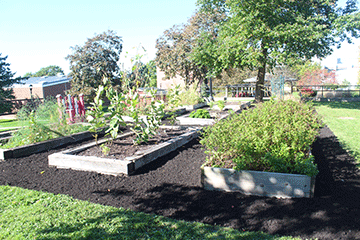
The meeting was an opportunity to come together as a SUNY Cortland community while sharing an interest in biology, diversity, sustainability or wholesome recreation. At the meeting, Chandler first provided some background and explained the components of an edible forest garden. Next, small groups each sketched out on paper their vision for a potential garden layout. The whole group then reconvened to share those various renderings, looking for the common elements to include in one final blueprint. “The idea is you bring all the constituents together to see what they would want in their forest garden,” Klein said of the recent charrette. “Because it should be a community space in addition to being a garden. While you’re talking about the diversity of plants we’re going to have there, you also need to respect the diversity of people. So there will be opportunities for people to mingle there. There will be some seating areas, we’re hoping to maybe have a little classroom space in there. Then, maybe an area for some art installations. So it becomes as much a community space as an edible forest garden.” Edible forest gardens do require some thoughtful planning, according to Klein. For example, it’s smart to avoid vines such as those in the Morning Glory family that tend to overshadow their host. Conversely, pea vines works in cooperation with their host. “Each plant usually has multiple purposes for being there. So an apple tree would provide apples to folks, but would also offer some shade for shade-loving plants that you might want to plant underneath,” Klein said. “The tree also might offer some structure for you to grow vines underneath. And the vines might put nitrogen back into the soil, which will help the apple tree. They all kind of work together and help each other out.” Currently, a much smaller Model Garden, with its nine square wooden boxes of soil brimming with flowers and vegetables in season, is positioned at the top of where the hoped-for future garden will begin. The edible forest garden will be about three to four times the size of its Model Garden neighbor. The two gardens won’t look the same. “Basically it’s more natural with less boundaries,” Chandler said. “So it’s going to look more like a forest than a planned-out garden. We’re going to have a place for everything. That will probably include trees, bushes, regular garden plants probably as well. But it will be set up more as a natural looking environment.” Much of the planned bed will contain perennial greenery that can survive the upstate winters. “Whereas most of the model garden is annual, that is they have to be prepped and planted each year, this garden will be planted once and taken care of, with some annuals, some of which might self-seed,” Klein said. The Sustainability Committee members became inspired to create this kind of garden by a guest speaker on campus last spring, Jonathan Bates, an Ithaca resident who co-authored, with Eric Toensmeier, Paradise Lot: Two Plant Geeks, One-Tenth of an Acre, and the Making of an Edible Garden Oasis in the City. “They actually bought a duplex together in Massachusetts and turned a city lot that was pretty much abandoned into an edible food oasis,” Klein said. “Madison hung around and showed a lot of interest in working on this project and that’s why she’s involved,” she said. Chandler added, “I won’t be here when this comes to be constructed but hopefully I will find someone else to take over.” The cost for mulch and saplings and perennials is covered, between the volunteers and the ongoing support that Facilities Operations and Services has shown, Klein said. What’s needed is enthusiastic volunteers. “We hope to involve people from the SUNY Cortland Child Care Center quite a bit because we think it would be a good creative space for the kids to get involved,” Klein said. To volunteer to become involved in building or maintaining the garden, contact the Sustainability Office in Cornish Hall, Room 1314, or email [email protected]. Orchestra plans holiday concert11/23/2021It’s hard to imagine what a piece of courtly baroque music would have in common with a love score written by the 19th century German composer Richard Wagner, never mind a seminal work of 20th century American minimalism. Music lovers will get the chance to find out what’s the same about three very different musical compositions during “It’s About Time,” the SUNY Cortland College Community Orchestra’s upcoming holiday concert on Tuesday, Dec. 7. The orchestra, which is made up of SUNY Cortland students, faculty and staff as well as area community members, will perform at 8 p.m. in the university’s Old Main Brown Auditorium. The concert will take place without an intermission and with all safety measures in place to allow the orchestra’s first in-person concert since campus COVID-19 safety measures shut them down in Spring 2020. This year, the holiday concert is being presented in an unusual art-and-music collaboration with Cortland Jr./Sr. High School students taking art teacher Judith Cogan’s Comprehensive Art course. The 9th through 12th graders in Cogan’s class designed, built and will exhibit a collection of suspended mobiles that will relate to the more modern musical selection. The concert title, “It’s About Time,” covers the connection between all the pieces, said Ubaldo Valli, a lecturer in the Performing Arts Department and conductor for the current, lean 30-piece orchestra. “The three pieces couldn’t seem more different,” Valli said. “However, they are all doing essentially the same thing, which is why I think the concert is an interesting one.” Selections will include:
In all three offerings, a busy musical foreground overlays a slow, deliberate musical background that anchors each piece. “The ‘In C’ piece I’m doing clearly moves very slowly,” Valli said. “And the two other pieces we’re doing reflect this.” ‘In C’ exemplifies minimalism, a musical genre that originated in the U.S. in the 1960s, according to Wikipedia. By stripping music down to its bare essentials, minimalism focuses on pure sonic power, pulse and the internal processes of the music, without a conventional musical narrative. “It is easy to think that in the piece a player can just do whatever they want, but it actually requires more individual discipline than playing in a regular orchestra because you have to be very attuned to the pulse that you hear throughout the piece and to what the other people are doing,” Valli said, “If you think that what you do doesn’t matter, you won’t be able to play the piece.” Not to be confused with purposely atonal music, Riley’s 1964 minimalist piece is nevertheless composed so as to never sound the same way twice. “It has 52 little snippets of music and there’s a constant pulse of the note “C,” Valli said. “The instructions are that the performers play each snippet for as many repetitions as they want. Each performer might decide to repeat a particular unit a different number of times. The perfect visual analog to that is the mobile.” “If you can sort of imagine clouds going by and changing colors, that’s another visual analog for how this musical piece moves,” he said. “You look at the music and it looks like a big nothing. Then you look again, and it’s so craftily put together, just really smartly done.” Valli finds inspiration by working with the high school art students. “My experience in doing this sort of collaboration with high schoolers has been that the students come up with such great solutions,” he said. Valli encourages the audience to experience the mobiles as fully as they wish. “I’m going to ask people to stand up and walk around, absolutely. In fact, this is actually a fairly common practice with minimalist music.” Some four hundred years before Riley’s inspiration, Purcell’s chaconne, that is, a series of chords that repeat over and over and over again, are heard in his masque or semi-opera called “The Fairy Queen (1692),” which is based on “A Midsummer Night’s Dream.” “There are eight bars that repeat all the way through the piece,” Valli said about Purcell’s music, geared to please a public audience. “It always has this foreground that is very busy while underneath it is moving very, very slowly.” Fast forward a few hundred years and German composer Wagner was composing “The Siegfried Idyll” for his wife. “He wrote it in secret,” Valli said. “She woke up on the morning of Dec. 25th hearing the music because Wagner arrayed the musicians on the staircase leading up to her bedroom. “As with the other selections, there’s all this surface activity, but underneath it’s all moving harmonically really slowly,” he said. For more information on musical ensembles and upcoming concerts, visit the Performing Arts Department webpage. Capture the MomentSUNY Cortland students, alumni and friends gathered at the Stadium Complex on Nov. 13 to see the Red Dragons defeat Ithaca College, 28-27, in the annual Cortaca Jug football game. The team plays in the second round of the NCAA Division III tournament at noon on Saturday, Nov. 27 at the Stadium Complex. See more photos from Cortaca Jug on Flickr. In Other NewsWishing the campus community a safe and happy ThanksgivingDear campus community, I want to wish all of you a very happy and restful Thanksgiving. I hope you are able to safely travel home and visit with family and loved ones during this holiday break. Thanksgiving is a time for all of us to reflect on our many blessings. I am grateful for so many things, especially the ways in which we were able to come back together as a campus this semester. Although the pandemic continues, we returned to a sense of normalcy through the tireless efforts of our students, faculty and staff. You took additional and extraordinary actions for the sake of the health of our community and for that I am sincerely thankful. Seeing face-to-face instruction, in-person internships, club meetings and sports on our campus once again has been wonderful. In our rejoicing this week, we should be optimistic — cautiously optimistic — about the future ahead. Some areas of the country are seeing rising COVID-19 cases. At SUNY Cortland, we have seen the proof that strategies such as vaccination, regular surveillance testing and face coverings help to limit the virus’ spread. Please be safe, enjoy this time away and share your spirit of gratitude with others. All the best, Erik J. Bitterbaum President Tickets on sale now for 2022 Cortaca Jug gameTickets for the 2022 Cortaca Jug football game at Yankee Stadium between SUNY Cortland and Ithaca College went on sale on Tuesday, Nov. 16, 2021. The game is scheduled for Saturday, Nov. 12, 2022, with a 1:00 p.m. kickoff. The tickets can be purchased at ticketmaster.com or cortacajug.com at prices ranging from $24.50 to $69.50. Fans may purchase up to 19 individual seats. A dropdown menu will allow purchasers the option of sitting on the SUNY Cortland side (third base/left field) or the Ithaca College side of the stadium (first base/right field). All tickets will be delivered digitally, and mobile presentation will be the sole method of entry. A football seating chart for Yankee Stadium is available online. In September, the schools and 5167 Sports Media LLC announced that they had partnered with the New York Yankees to have Yankee Stadium play host to the 2022 Cortaca Jug rivalry game. Once referred to by Sports Illustrated as "the biggest little game in the nation," the Cortaca Jug was played in 2019 before a Division III-record crowd of 45,161 fans at MetLife Stadium. This fall's matchup will take place on Nov. 13 at SUNY Cortland. Campus community tickets Seats on the 400 level of Yankee Stadium will be reserved for SUNY Cortland and Ithaca College students, faculty and staff at the price of $24.50. These tickets will be sold by the respective schools in the fall of 2022. Members of the campus communities may purchase seats in advance of the campus on sale during the general ticket sale that begins on Nov. 16. All fans are highly encouraged to purchase tickets as soon as possible to ensure the availability of the best possible seats of their choice. Members of the Class of 2022 and students graduating prior to the fall should note that campus community tickets will only be open to current students in the fall of 2022. Those students are encouraged to purchase tickets now. Guests with disabilities For information regarding Yankee Stadium ticketing and services for guests with disabilities, fans may visit Yankee Stadium’s guide for guests with disabilities or email [email protected]. Please note that wheelchair accessible and designated aisle-transfer seats are available at various price points and locations. Yankee Stadium also offers enhanced accessibility for guests with hearing loss or low vision and for guests who are deaf or blind. Red Dragon alumni events We can’t wait to celebrate in the Bronx with all the SUNY Cortland alumni who are planning to attend! Details will be shared with you as soon as they are finalized. Check RedDragonNetwork.org for SUNY Cortland alumni information and follow the SUNY Cortland Alumni Association on Facebook, Instagram and Twitter for updates. For the latest on all things SUNY Cortland athletics, visit CortlandRedDragons.com. International student photo contest winners selectedMany SUNY Cortland international students recently were recognized for fun and interesting photographs documenting their experiences while studying in the United States. Twenty students submitted photos for the annual contest organized by the university’s International Programs Office. Cities including New York City, Miami and Toronto were represented in photographs. A full gallery of the winning entries can be found online, under the Photo and Video Contest tab. Photos covered three categories: “capture the moment” encouraged submissions showing unique study abroad experiences; “world of wonder” offered creative or artistic views of landscapes and other small details; and “live like a local” invited photos of local adventures. More than 400 people from around the world selected a popular choice entry for each category. First-prize and runner-up selections were chosen by a committee of SUNY Cortland faculty, staff and students. The full list of winners is pasted below. Fall 2021 International Student Photo Contest WinnersCapture the Moment CategoryFirst Prize Katharina Thies Title: Above the roof of New York City Location: New York City
Runner-up Diya Digvijay Singh Title: NYC Location: Times Square, New York City
Popular Choice Muhammet Altunsoy Title: Niagara Falls Location: Buffalo
Honorable Mention Nethravathi Bhupathi Title: Liberty Location: New York City
Honorable Mention Ludwig Degmayr Title: A bridge to a bigger world Location: Brooklyn Bridge, New York City World of Wonder CategoryFirst Prize Ardesian Binjakaj Title: Skypierce Location: Niagara Falls, NY
Runner-up Student Name: Louisa Pfisterer Title: Beach sunrise Location: South Beach, Miami
Popular Choice Jonas Zantis Title: Strolling through Buffalo Location: Buffalo
Honorable Mention Leonard Finke Title: Toronto skyline Location: Toronto
Honorable Mention Merlin Moschkau Title: Panorama of Raquette Lake Location: Raquette Lake, NY Live Like a Local Category
First Prize William Gereke Title: The proper technique for apple picking Location: New York
Runner-up Rebecca Blomenkamp Title: White water rafting Location: New York
Popular Choice Deepna Karan Title: Friends Location: Beak and Skiff Apple Orchards, Lafayette, NY Honorable Mention Fahima Aqtar Title: Beauty in diversity Location: Taughannock Falls, Ithaca, NY
Honorable Mention Katharina Ammann Title: Titanic Location: Niagara Falls, NY Fall athletics roundupIt was a very successful fall season for SUNY Cortland’s varsity athletic teams. Here are some of the highlights from Red Dragons student-athletes and coaches: Football The season continues for SUNY Cortland’s football team on Saturday as it hosts Rensselaer Polytechnic Institute in the second round of the NCAA Division III tournament at noon at the Stadium Complex. The Red Dragons defeated Springfield, 26-21, in the opening round of the NCAA tournament on Nov. 20. Cortland dominated the Empire 8 awards for the 2021 season, as 15 players were named first team all-conference. Senior quarterback Brees Segala was named Offensive Player of the Year, senior linebacker Dylan Dubuque was named Defensive Player of the Year and sophomore defensive lineman Nick Lardaro was the league’s Rookie of the Year. The coaching staff, led by head coach Curt Fitzpatrick, was recognized as the best in the Empire 8. Cross country Junior Ryan Cory earned All-America honors with a 40th place finish out of 299 runners at the NCAA Division III men’s cross country championships in Louisville, Ky. on Nov. 20. Cory, who had finished first at the Division III Region 3 Championships at SUNY Geneseo on Nov. 13, is the 13th Cortland men’s runner to earn All-America honors. Cortland’s men’s team placed second at the SUNYAC championships and was fifth at the Region 3 championships. The women’s cross country team, led by freshman Vanessa Burkard, placed fourth at the SUNYAC Championships in October. Field hockey Field hockey finished the 2021 season with a 16-3 record after a 2-1 overtime loss to Ohio Wesleyan in the first round of the NCAA Division III tournament. Freshman forward Kierra Ettere, who scored 26 goals and had eight assists in 18 games, was named the SUNYAC Player of the Year and Rookie of the Year and was named first team all-conference. Freshman forward/midfielder Hanna Corrigan, junior forward Lily Fox and senior goalie Megan McGuinness were also first team all-conference selections. Women’s golf Women’s golf closed the fall portion of its season by winning the team title at the Nazareth Invitational on Oct. 10. Freshman Paige Cerminaro won the tournament by six strokes. Cerminaro was the runner-up – and freshman Claudia Winterberg was fourth – as Cortland won the Williams College Women’s Golf Fall Invitational on Oct. 3. Men’s soccer The men’s soccer team finished tied for ninth nationally with a record of 18-3-1 after its season ended with a 4-1 loss to Amherst in the third round of the NCAA Division III tournament on Nov. 20. Graduate student Blake Aronson led the nation with 10 game-winning goals. Seven Cortland players were named to the All-SUNYAC team and coaches Steve Axtell, Sean Streb and Drew Francisco were picked as the conference’s Coaching Staff of the Year. Women’s soccer The women’s soccer team went 10-5-3 and saw its season end in a 1-0 loss to SUNY Geneseo in the SUNYAC championship game. Eight players were named to the All-SUNYAC team, including first team selections: senior forward Jaden Galluzzo, freshman midfielder Katie Cosenza and junior midfielder Bryn Thompson. Swimming and diving The Red Dragons were double winners, with both the men’s and women’s teams placing first at a dual meet at Buffalo State on Nov. 13. Senior diver Taylor Williams was named the SUNYAC Women’s Diver of the Week on Nov. 9. Williams was second in 1-meter diving and third in 3-meter diving during a dual meet at Ithaca College to open the season. The swimming and diving season resumes at the Cortland Snowflurries Invitational on Dec. 3 and 4. Women’s tennis The women’s tennis team completed the fall portion of its schedule with a 5-3 record, including a 4-1 mark in SUNYAC play. The season will resume in April. Junior Abby Madigan was named SUNYAC Singles Player of the Week in September after winning 6-0, 6-0 in a non-league match at Alfred University. Volleyball Volleyball finished the season tied for 17th in the nation with a record of 27-4 following a loss to Tufts in the second round of the NCAA Division III playoffs. Cortland had defeated Geneseo in the SUNYAC finals and Merchant Marine in the opening round of the NCAA tournament. Senior outside hitter Hannah Southcott and junior libero Carly Haegele were selected as honorable mention All-Americans by the American Volleyball Coaches Association. Head coach Erin Glickert was voted the ACVA’s Region 3 Coach of the Year. For the latest on SUNY Cortland athletics, visit CortlandRedDragons.com. SUNY Cortland students combat hungerFifteen teams of SUNY Cortland students raised nearly $10,000 during this year’s annual CROP Hunger Walk, in what national organizers say is the strongest student showing of any of the more than 2,000 CROP fundraising walks held across the nation. A total of 318 members of the campus community registered to walk up to three miles through downtown Cortland on Oct. 24 in the 27th annual local event, which raises money for global and domestic anti-hunger programs. That means 85% of the 375 people who participated in the walk were Red Dragons. “I've been involved in administration of the CROP Hunger Walk's online giving program for 20-plus years and have always been impressed with the level of student participation in the Cortland Hunger Walk,” said Daryl Stam, an administrator with Church World Services, the umbrella organization that co-ordinates the fundraising walks. “I believe SUNY Cortland has the highest involvement of college students of any of our events.” With 15 student-organized teams, Cortland had more than any other university, Stam said. The next highest number was 11. SUNY Cortland students, who solicited pledges of support from family and friends, raised 63% of the $15,914 generated by the local event. Local organizers Jim Miller, a former SUNY Cortland history lecturer, and Jeanine Rose, a tutor in the university’s Learning Center, believe it’s the most successful Red Dragon Crop Hunger Walk effort yet. The biggest fundraising group was the SUNY Cortland softball team, with $2,531 in donations. Second was the men’s lacrosse team, with $1,969, followed by Delta Phi Epsilon sorority with $1,448. Twenty-five percent of the funds raised in the county are returned to support local food pantries and feeding programs including the SUNY Cortland Cupboard. Every year, plaques are awarded to the top fundraising teams. Miller will present those honors later this semester. Ceremony raised awareness about transgender violenceLast year, the transgender community marked a terrible national milestone as 44 transgender or gender non-conforming people were killed. At the time, it was the highest annual number of violent deaths since the Human Rights Campaign began tracking the trend in 2013. On Nov. 18, the SUNY Cortland campus community were made aware of an even worse number. With more than a month left in 2021, 45 transgender individuals have been killed in the U.S. And those are just the transgender homicides we’re aware of. The Human Rights Campaign notes that law enforcement agencies don’t always report such deaths accurately or honor the deceased’s gender identity, making it very difficult to learn about all the victims. Members of the SUNY Cortland community participated in a late afternoon vigil for this year’s victims on Nov. 18 in front of Corey Union. The official Transgender Day of Remembrance was Nov. 20. 
The ceremony featured an online slideshow of pictures of those 45 people who have been killed, which is still available. Each includes an embedded link to their individual life stories, as told by those who had loved and befriended them. The stories linked to in this presentation were created by the Human Rights Campaign, the nation’s largest LGBTQ advocacy group. At the vigil, campus community members read names of the people who lost their lives, explained Kristine Newhall, an associate professor of kinesiology and a Transgender Day of Remembrance Subcommittee member for SUNY Cortland’s Sexual Orientation, Gender Identity and Expression (SOGIE) Committee. SOGIE is dedicated to fostering a safe and positive environment for the LBGTQIAP communities at SUNY Cortland. “One of the issues we have discussed in SOGIE is the need for people to recognize that the violence against trans people is disproportionately against people of color,” Newhall said. As microcosms of the country as a whole, college campuses are grappling with violence against transgender and non-gender conforming campus community members. 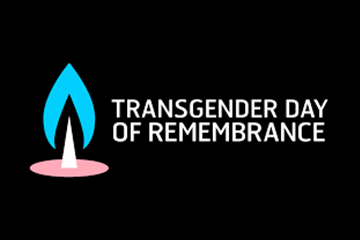
“I know from my own research and work that there’s now a very active backlash in many states against transgender people generally,” Newhall said. “The violence often takes the form of micro-aggressions, which aren’t any less valid,” Newhall said. “What we see is people being told they’re in the wrong bathroom. Having the wrong names used, having the wrong pronouns used. “While we’re working on those things as a campus community, and we’ve started initiatives and trainings and things like that, it doesn’t mean that this doesn’t still happen.” Transgender Day of Remembrance was started in 1999 by transgender advocate Gwendolyn Ann Smith as a vigil to honor the memory of Rita Hester, a transgender woman who was killed in 1998. The vigil commemorated all transgender people lost to violence since Rita Hester's death in 1998. It has become an annual tradition. 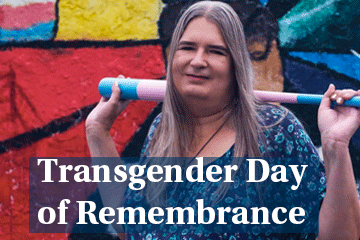
“Transgender Day of Remembrance seeks to highlight the losses we face due to anti-transgender bigotry and violence,” Smith wrote at the time. “I am no stranger to the need to fight for our rights, and the right to simply exist is first and foremost. With so many seeking to erase transgender people — sometimes in the most brutal ways possible — it is vitally important that those we lose are remembered and that we continue to fight for justice.” SOGIE’s Transgender Day of Remembrance Subcommittee also recognized the activism and advocacy of the Anti-Violence Project, which works to end violence against LGBTQ and HIV-affected persons, and the Human Rights Campaign. President urges students to consider vaccine boostersDear students, I want to share with you some important news about COVID-19 vaccine booster shots. This morning, the U.S. Food and Drug Administration authorized use of single booster doses for all fully vaccinated individuals 18 years of age and older. If you received the Moderna or Pfizer-BioNTech vaccines and had your second dose on or before May 5, you are eligible for a booster. If you received the Johnson & Johnson Janssen vaccine on or before Sept. 5, you also are eligible for a booster. I want to be clear: SUNY system and SUNY Cortland are not mandating or requiring COVID-19 vaccine booster shots for students at this time. That policy may change in the future. If it does, the university will communicate this information to you. I will, however, strongly recommend that all students seriously consider getting a vaccine booster. These boosters will provide continued protection against COVID-19, which is vital for your health as well as that of your family, classmates, faculty and neighbors. New York State has a COVID-19 vaccine website that can help you find an appointment. You may want to schedule this during Thanksgiving break. You should also seriously consider getting a seasonal flu shot to keep you and your loved ones protected from illness this winter. These shots are available at most pharmacies and often you can get both the flu shot and the COVID-19 booster at the same time. If you are feeling any symptoms of COVID-19 or flu, such as fever, chills, sore throat, cough, runny nose or headaches, please call Student Health Service at 607-753-4811 to schedule a test or get advice on your best course of action. Please stay home from class and other activities and contact your faculty members about your absence. Your professors will work with you to make arrangements and will be grateful that you are doing the right thing to keep the campus community healthy and safe. Please be safe and have a wonderful weekend, All the best, Erik J. Bitterbaum President SUNY Cortland celebrates advice from former non-traditional studentsSUNY Cortland continued a celebration of non-traditional students in the month of November with social media highlights of faculty and staff members who once were non-traditional students themselves. The university defines non-traditional students as undergraduate students who are 24 years of age or older or, regardless of age, have dependent children, work full-time, have military experience or have made a break in education at some point after high school. In addition to profiles of current students and activities for Non-Traditional Students Week from Nov. 15 to Nov. 19, the university shared the following advice from faculty and staff members.
Chris Widdall ’00 Assistant Dean for Assessment and Accreditation Undergraduate degree: Health Education Advice for non-traditional students: “Make time for yourself. You will have many responsibilities, but the most important responsibility is to keep yourself well. My escape has always been the solitude of nature even if it is just for a moment. It brings it all back into focus so I can prioritize. Find your place to take care of you.”
Tracy Frenyea Academic Advisor and Coordinator, Graduate Student Support Undergraduate degree: Psychology, SUNY Oswego Advice for non-traditional students: “I know that non-traditional students have a lot of obligations and responsibilities outside of all their classes, textbooks, exams and projects. When I went back to graduate school at the age of 43, I found motivation in the Winston Churchill quote: ‘Never give up on something you can’t go a day without thinking about.’ In fact, it’s still tacked on my bulletin board above my desk 10 years later.”
Joshua Peck ’07 Associate Professor, Psychology Undergraduate degree: Psychology Advice for non-traditional students: “You have unique life experiences and wisdom to bring to the classroom and campus as a whole. Traditional students will be enriched by you. So, don't be afraid to use it!”
Amanda Sharpsteen ’17 Application Support Analyst Undergraduate degree: Business Economics Advice for non-traditional students: “Don’t be afraid to speak up in class. You may be older than some of the traditional students, but that means you have a unique perspective and set of experiences to bring to classroom discussions.”
Denise Knight Distinguished Teaching Professor Emerita of English Undergraduate degree: English, University at Albany Advice for non-traditional students: “My best advice to non-traditional students is to treat your education like it’s the most important job you will ever hold. The work ethic you establish in college will follow you for the rest of your life. When I entered college as a freshman at the age of 26, I created a schedule where I took classes three days a week. On the days I didn’t have classes I sat down with my books and studied from 8 a.m. until noon; took a half-hour lunch break, and resumed my studies from 12:30 to 4:30 p.m. I was proud to put myself through college and to graduate summa cum laude. The discipline I practiced paid off. Just five and a half years after I entered the university as a college freshman, I walked out with a doctorate in English. It wasn’t easy. It meant taking 18 to 21 credit hours every semester and attending classes each summer, but it was incredibly validating for a kid who attended a two-room schoolhouse in a village of fewer than 300 people and whose parents thought that ‘girls’ didn’t belong in college.” Mother of three is university seniorLast fall, Christina Wells had just begun her educational journey at SUNY Cortland when a dramatic spike in campus COVID-19 cases threw her into remote learning mode. For the rest of the academic year, the senior physical education major attended her virtual classes while managing her active 9-, 6- and 3-year-old boys, who were usually being wrangled off-camera and out of screen sight by her parents or fiancée. Most of the time, at least. “My professors know all my kids very well,” Wells said. This year, with students back in the classroom, life is much different for the transfer student from SUNY Broome. Every morning she pops her two oldest children on the school bus before dropping off her youngest at pre-school and driving half an hour up Route 81 from Whitney Point to Cortland. “This fall has been crazy,” she said. “It’s actually been super nice being in person. I’ve had so much better relationships with other peers and that’s been nice to build on. But it’s definitely been harder for me, because I have three kids. My schedule is just so jam packed.” That’s no surprise, given that Wells also serves as president of SUNY Cortland’s Non-Traditional Student Organization. But she said that planning the Non-traditional Students Week (Nov. 15 to 19) of social activities for her estimated 250 non-traditional classmates on top of everything else has been worth it. “It makes me have a connection to people who are going through similar struggles to mine,” Wells said. “Sometimes you feel like an oddball, so it’s nice to have that sense of community with others who can relate.” Wells grew up in Whitney Point and earned an associate’s degree in criminal justice at SUNY Broome in 2008. Instead of a law enforcement career, however, she worked as an optician’s assistant in Norwich for several years before starting her family. At some point, becoming a police officer stopped sounding like such a good idea to her. “I have a family to think of,” Wells said. “I didn’t want to put myself in a situation that was dangerous. 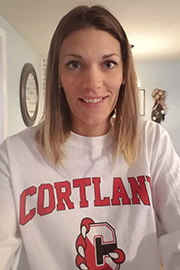
“Then I thought to myself, ‘Gosh, I would love to teach physical education.’ It literally popped into my head one day.” Wells was encouraged to enroll by Virginia Wright, then the advisement coordinator in the Physical Education Department. Knowing how demanding the activity classes would be for her, Wells first completed preparatory coursework in sport studies at SUNY Broome. She finds herself surprised at the youthfulness and assertiveness of her physical education classmates, many of whom can boast of playing on a sports team. “I admire them for being the confident people that they are and being able to do what they’re doing,” she said. “It’s really tough and I’m proud of all them, I really am.” Wells feels her own future educational role is with a different kind of child. “Athletic, I really wasn’t,” she said. “I was the kid who didn’t have much confidence in myself or my abilities. So if I could be the one who helps one of those kids gain that confidence, then good.” Approximately 250 non-traditional students are enrolled at SUNY Cortland. The university defines non-traditional students as undergraduate students who are 24 years of age or older or, regardless of age, may have dependent children, be working full-time, have military experience or have made a break in education at some point after high school. SUNY Cortland acknowledged individuals including Wells from Monday, Nov. 15, through Friday, Nov. 19, during its celebration of Non-Traditional Students Week. Stories about outstanding non-traditional students were shared during the week, which also included a host of special activities, both on campus and virtually. Honoring a non-traditional studentJunior physical education major Aaren Woodworth doesn’t stand out as a non-traditional student at SUNY Cortland. “I blend in very, very well,” said Woodworth, a Long Island native who grew up in Lindenhurst, N.Y. “We did an adventure activity in which we had to line up with each other in order of age, and people kept trying to cut in front of me. I kept saying, ‘I’m 25,’ and people would say, ‘Never mind.’” Separated from classmates by a few years and a wealth of life experience, Woodworth sometimes finds life back on a college campus is a little weird. “But at the same time I’m very fortunate to have had the life experiences that I’ve had,” he said. “I feel I can be of assistance to people.” In 2014, fresh out of high school as a conventional biology student with a chemistry minor at Hofstra University, he had his eyes on medical school. “Honestly, my grades weren’t bad, but I wasn’t as passionate as the people around me were,” Woodworth said. “I wasn’t interested in going to Biology Club. I thought this should be a whole lot easier if this is what I wanted to do forever.” He dropped out of college in late 2015 and began transitioning his gender identity to the man he felt he was really meant to be. “I was focused on living my life authentically and paying the bills,” he said. “My transition, and mental health issues, played a large role in my dropping out of Hofstra.” Woodworth made coffee at Starbucks, rising in responsibility while living on his own in Uniondale, N.Y. In 2018, he sold life insurance. “Then I decided to take a job at a summer camp,” Woodworth said. “I thought, ‘What more fun way to spend a summer,’ and it would be a lot more interesting. I was looking for a complete change of pace.” “There’s nothing like being outdoors. It’s such clarity, it’s awesome,” said Woodworth, who since that summer in 2019 has continued to work summers at Kenwal Day Camp in Melville, N.Y. He earned certification to safely supervise the camp’s climbing wall and also became a specialist in managing a zip line and an obstacle course. “I was the oldest applicant so they trusted me to keep the kids safe on the wall,” he said. “I ruled that activity with an iron fist. I told those kids, ‘If this was a basketball court, I wouldn’t have to be that crazy about this. But it’s 12 feet in the air so if you can’t listen to me on the ground, you can’t go into the air.’ “That job really changed my life, helping those kids overcome challenges and challenge themselves and face their fears. Over the summer I saw so much real learning and growth in those kids and I developed so many relationships with others. I learned so much about myself. “I wanted to do this forever, but the kids go to school for 10 months of the year. I was trying to think of the best subject of teaching different types of lessons in experiential learning. And physical education was the answer.” An online search led him to SUNY Cortland’s Physical Education Program, where he decided to concentrate in outdoor adventure education. “It’s all about finding those lifetime activities that we can enjoy,” he said. “You won’t always have that soccer team to join. But rock climbing, orienteering and hiking will always be there for you.” At 23, he deferred enrollment until Fall 2020 while taking classes at his local community college.Woodworth currently serves in his second semester as a teaching assistant for the health-related physical fitness course taught by Bryce Farrell, an adjunct lecturer in physical education. “Physical education has the elements of biology and chemistry,” Woodworth said. “We learn about the body, we learn about how the body moves. It’s amazing, really, how well it’s fitting together. And how I couldn’t bring myself to be as engaged and passionate with the regular biology material, but seeing very similar material in a different context, it’s a world of difference.” Woodworth sometimes feels a bit like a physician-in-training. “Really, I like to think of physical education as kind of like preventive medicine, in a type of way, like preventive pediatrics,” Woodworth said. “Because if they can take care of themselves from the beginning, hopefully they don’t have to go see the doctor later on. It gives them all the tools they need to be successful.” Looking back on his own high school experience, he sees a real need for professionals who are less focused on team sports. “I would love to be able to do a better job so they don’t end up unsure of how to take care of their own health,” Woodworth said. “That they understand basic nutrition. They understand it’s very important to stay active. That just because they don’t think they are interested in sports doesn’t mean they don’t have a body that needs to be maintained to stay healthy.” On Nov. 19, 2020, during that year’s Transgender Awareness Week, he joined Nancy Kane, an adjunct lecturer in kinesiology, who has a current research focus on the question of transgender and nonbinary sports participation in a binary sports world. They presented a virtual President’s Office sandwich seminar titled “Toward a Future of Athletic Inclusiveness: Perspectives on Transgender and Nonbinary Collegiate Participation in Sports Activities.” They discussed the many barriers to sport participation for students with a non-binary gender identity, including language, testing, feeling physically safe in athletic facilities and access to sport team membership. “I got a lot of really great support,” he said. “It definitely was me stepping outside my comfort zone. I’m thankful to Dr. Kane for allowing me to do so. I was able to talk about my own personal issues. Just a little vulnerability goes a long way.” Woodworth is set to co-present a similar lecture later this month at the New York State Association for Health, Physical Education, Recreation and Dance Conference in Verona, N.Y. He’s never met his co-presenter Casey Langendorfer, a middle school health teacher, but they connected over email after he had admired her presentation. Woodworth will accompany his classmates to Washington, D.C., for the national physical education “Speak Out Day” of advocacy, where he will get the chance to explain to legislators in person that educating the whole student encompasses physical education. Once he graduates with his Bachelor of Science in Education in spring or December 2023, Woodworth has his eyes on obtaining physical education teaching certification as well as the health certification he’ll need in order to teach on Long Island. Then he’ll look into enrolling in a graduate school in his field. 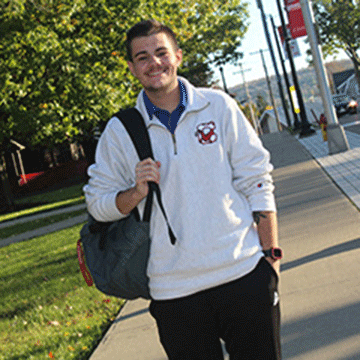
“I would like a grad assistantship. I would really like to do it at Cortland, honestly. It will either be a physical education or a health education degree. “And then I’d like to teach in preschool or elementary school,” Woodworth said. “That is where my personality fits in the best.” He envisions summers directing a non-competitive sport type program for those very same schoolchildren. “Whether it’s a morning or after school program to an elementary school or even a middle school, I just want to offer a type of elective physical activity to teach them those lifetime skills a little bit early or just give them a taste of it, maybe.” Woodworth is excited to have found his life’s direction. “It’s easier to be a non-traditional student in a ton of different ways than to be a traditional student,” he said. “We come with our unique set of challenges. But in terms of priorities, my whole priority is set on school and is exactly where it needs to be. I know I’m meant to be here doing this.” Approximately 250 non-traditional students are enrolled at SUNY Cortland. The university defines non-traditional students as undergraduate students who are 24 years of age or older or, regardless of age, may have dependent children, be working full-time, have military experience or have made a break in education at some point after high school. SUNY Cortland acknowledged individuals including Woodworth from Monday, Nov. 15, through Friday, Nov. 19, during its celebration of Non-Traditional Students Week. Stories about outstanding non-traditional students were shared during the week, which also included a host of special activities, both on campus and virtually. Non-traditional student overcame life’s obstaclesTen years ago, Mathew Adams had everything going for him. The Lansing, N.Y., high school graduate had returned to his home town after working full time on Long Island, focused and determined to earn his associate’s degree at Tompkins Cortland Community College, then pursue a bachelor’s degree at St. John’s University. “I had every intention of fulfilling what I needed to enroll at St. John’s,” said Adams, 38. “I was on a pretty serious path about my studies. “Then, the house I was living in with two of my friends burned down and one of my best friends passed away in that fire,” he said. Adams lost his good friend Ryan Burris in 2011. “I had spent some time in the hospital after that because I had tried to go in and get him out and I didn’t succeed. I ended up with some burns and bad smoke inhalation.” That was Adams’ story from about 10 years ago to two years ago, when he enrolled at SUNY Cortland. 
“I was trying to process that whole situation, putting myself back out there. It took a long time. I’m not sure I’d be where I’m at now, in terms of the success I’ve enjoyed here, without me going through that whole process.” Adams’ story took a turn for the better two years ago when he and his girlfriend, Brittany Morgan ’21, had a spat. “It was spring semester two years ago when my fiancé, who is eight years my junior, had decided to finish her degree here. We were arguing, and she said, ‘Why don’t you go back to school?’ And I said, ‘Why don’t I?’” And the next semester he enrolled at Cortland. Morgan subsequently demonstrated the value of a Cortland education by graduating with a degree in health care management on a Friday and landing her first post-graduate job the following Monday, working for an assisted living care facility in Ithaca, N.Y. Adams is now a second semester senior communication studies major who graduates in December. He is also a radio personality. SUNY Cortland students may recognize Adams’ name and the calm, confident voice heard on his WSUC 90.5 FM radio broadcasts. He is currently the program director and frequent co-anchor of popular segments, including the Campus Conversations series that air periodically on SUNY Cortland’s National Public Radio-affiliated campus radio station. And, like many non-traditional students, Adams leads sort of a double life, split between the campus and his home, fiancée and job in Ithaca, N.Y. “When I’m not at work I’m usually here. It’s just the reality of it.” Adams still found time to serve as a judge of movies competing in this past summer’s Blackbird Film Festival. Adams also recently won a $2,500 scholarship from Alpha Sigma Lambda toward his university expenses in a prestigious national competition for non-traditional students. “Honestly it helped me out tremendously, financially,” Adams said. “It’s humbling, too. I try not to get too caught up in successes or failures.” Created in 1945, Alpha Sigma Lambda awards scholarships to assist adult learners financially who are earning their first undergraduate degree. Only 20 were offered this year. Colleges all over the country can refer up to two nominees to the competition, and Adams becomes the fourth SUNY Cortland candidate to be honored with a monetary award since 2010. Past honorees include Rachel Alexander ’10, Karyn Scott ’16 and Corrine Edick ’17. “I didn’t expect to win the scholarship,” Adams said. “I went onto the Alpha Sigma Lambda website, because they do profiles of some of their scholarship winners, and read these stories. “Once you reach a certain age you realize everyone’s got a story,” said Adams “I thought, ‘Oh, these amazing people on there, they’re doing exactly what I’m doing plus they have a couple of kids. Some of the younger non-traditional students there amaze me, too, because I remember not being that focused when I was that age.” Adams isn’t sure what he’ll do after he graduates in December, but he might hang around to take two classes to clinch a concentration in journalism while extending his role at WSUC 90.5 FM. Those choices were enabled by the unlooked-for Alpha Sigma Lambda scholarship. “When they told me I was one of the two nominees out of Cortland, that was honor and validation enough,” Adams said. “I never expected to win. “I would probably credit all the people who supported me in coming back to school, including a number of great professors here. And my classmates as well and my family’s been great.” Approximately 250 non-traditional students are enrolled at SUNY Cortland. The university defines non-traditional students as undergraduate students who are 24 years of age or older or, regardless of age, may have dependent children, be working full-time, have military experience or have made a break in education at some point after high school. SUNY Cortland acknowledged individuals including Adams from Monday, Nov. 15, through Friday, Nov. 19, during its celebration of Non-Traditional Students Week. Stories about Adams and other outstanding non-traditional students were shared during the week, which also included a host of special activities, both on campus and virtually.  Suggest a feature story Suggest a feature story
Faculty/Staff ActivitiesKati AhernKati Ahern, English Department in Professional Writing and Rhetoric, had an article “Soundscaping Learning Spaces: Online Synchronicity and Composing Multiple Sonic Worlds” published for a special issue on learning spaces in Postdigital Science and Education. Adam Ferguson M ’12Adam Ferguson M ’12, English Department, presented his paper “Written Beyond the Body: Queer Narratives, Transgender Identity, and Sem-erotics” at the 2021 Conference of the Semiotic Society of America. The virtual conference was held from Oct. 20 to 23. Tadayuki SuzukiTadayuki Suzuki, Literacy Department, presented with Darryn Diuguid of McKendree University and Barbara Ward of the University of New Orleans at the 2021 National Council of Teachers of English on Nov. 21 in Louisville, Kentucky. It was a Zoom Conference due to COVID-19. “Exploring Intersectional Identities in Award-Winning LGBTQ-Themed Children’s Books” was part of the roundtable sessions titled “Queer Intersections of Equity, Justice, and Antiracism.”  Submit your faculty/staff activity Submit your faculty/staff activity
|
The Bulletin is produced by the Communications Office at SUNY Cortland and is published every other Tuesday during the academic year. Read more about The Bulletin. To submit items, email your information to [email protected]
© 2026 SUNY Cortland. all rights reserved.
